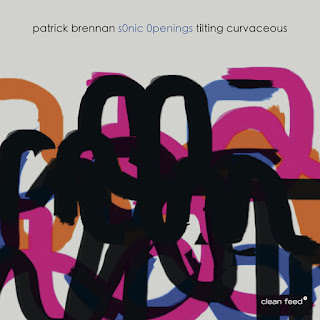By Paul Acquaro
I first heard saxophonist patrick brennan play at a solo show at Downtown Music
Gallery, long long ago in a galaxy far far away. I recall being quite impressed with his fiery and rhythmic playing and on his
tremendous Tilting Curvaceous, a quintet recording featuring a stellar
cast of musicians, brennan merges his effusive sound with a set of thematic
compositions that takes classic free jazz concepts and stretch them out with
fantastic imagination.
Gallery, long long ago in a galaxy far far away. I recall being quite impressed with his fiery and rhythmic playing and on his
tremendous Tilting Curvaceous, a quintet recording featuring a stellar
cast of musicians, brennan merges his effusive sound with a set of thematic
compositions that takes classic free jazz concepts and stretch them out with
fantastic imagination.
The description on Bandcamp says, “the music’s orienting matrix is
constructed from a series of melodically coded polyrhythmic cells whose
connective tissue may suggest nearly unlimited transformations.” This somewhat
bewildering sentence is a perfect description to the feel of the
music. Wrapped in the group’s simultaneous melodies and unusual musical paths,
you can hear the elasticity and tenacity of brennan’s composition. Look too at
the band composition, complimenting brennan’ alto sax is trumpeter
Brian Groder whose
works is always melodic and probing. Add Rod Williams, whose approach
to the piano provides a solid foundation and jolts of energy at opportune moments. Drummer
Michael TA Thompson and bassist Hilliard Greene add absolutely essential
rhythmic drive and sensitivity. The group takes brennan’s musical cells and generates
a cohesive, elastic, and generous whole.
constructed from a series of melodically coded polyrhythmic cells whose
connective tissue may suggest nearly unlimited transformations.” This somewhat
bewildering sentence is a perfect description to the feel of the
music. Wrapped in the group’s simultaneous melodies and unusual musical paths,
you can hear the elasticity and tenacity of brennan’s composition. Look too at
the band composition, complimenting brennan’ alto sax is trumpeter
Brian Groder whose
works is always melodic and probing. Add Rod Williams, whose approach
to the piano provides a solid foundation and jolts of energy at opportune moments. Drummer
Michael TA Thompson and bassist Hilliard Greene add absolutely essential
rhythmic drive and sensitivity. The group takes brennan’s musical cells and generates
a cohesive, elastic, and generous whole.
Structurally, Tilting Curvaceous is a collection of 14 short tracks,
all given a ‘Part n‘ title. ‘Part 1’ begins with the piano delivering
an intriguing syncopated riff, just on the atonal side with with hints of a
melodic hook. Quickly, the others join in with colliding harmonic ideas. Soon,
‘Part 2’ begins, which is a bit of slow burning ballad containing some
visceral remnants of initial theme, if not exact notes. The mood of this track
continues through brennan’s solo, which burns reservedly over minimal
accompaniment. ‘Part 3’ then starts with an uptempo rhythmic intro from
Thompson, joined by Williams and Greene driving like a classic 1960s free
jazz. Skipping ahead, ‘Part 7’ leads with disjointed phrasing,
free playing, but remains connected through a compositional – or maybe –
organizational thread. Later, ‘Part 10,’ which after some arpeggiated flair from
the piano, transitions to an intervallically akimbo melodic statement from
brennan that is quickly followed by Groder’s own. Other places, like in
‘Part 11,’ there is jagged but flowing piano work, in which strands of
classical leaning passages are augmented and fractalized in the same
moment. Greene is featured on the next track in a long bass introduction,
which then builds to a modern post/bop cadenza.
all given a ‘Part n‘ title. ‘Part 1’ begins with the piano delivering
an intriguing syncopated riff, just on the atonal side with with hints of a
melodic hook. Quickly, the others join in with colliding harmonic ideas. Soon,
‘Part 2’ begins, which is a bit of slow burning ballad containing some
visceral remnants of initial theme, if not exact notes. The mood of this track
continues through brennan’s solo, which burns reservedly over minimal
accompaniment. ‘Part 3’ then starts with an uptempo rhythmic intro from
Thompson, joined by Williams and Greene driving like a classic 1960s free
jazz. Skipping ahead, ‘Part 7’ leads with disjointed phrasing,
free playing, but remains connected through a compositional – or maybe –
organizational thread. Later, ‘Part 10,’ which after some arpeggiated flair from
the piano, transitions to an intervallically akimbo melodic statement from
brennan that is quickly followed by Groder’s own. Other places, like in
‘Part 11,’ there is jagged but flowing piano work, in which strands of
classical leaning passages are augmented and fractalized in the same
moment. Greene is featured on the next track in a long bass introduction,
which then builds to a modern post/bop cadenza.
That’s only the half of it, there is a lot packed into the recording.
Tilting Curvaceous, from patrick brennan sOnic Openings is stylistically varied, expansive,
expressive, and always engaging. The music pulls from classic free and
avant-garde jazz history while digging liberally into further afield rhythmic
motives and ideas, resulting in an absolutely delightful and engrossing
album.
Tilting Curvaceous, from patrick brennan sOnic Openings is stylistically varied, expansive,
expressive, and always engaging. The music pulls from classic free and
avant-garde jazz history while digging liberally into further afield rhythmic
motives and ideas, resulting in an absolutely delightful and engrossing
album.


